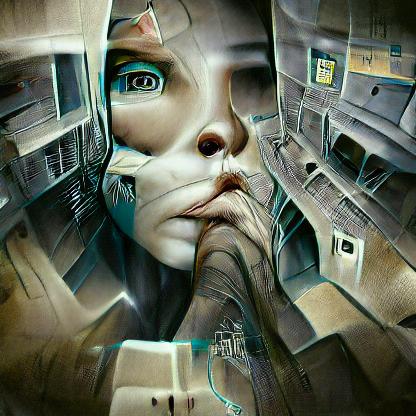The bold at the beginning is the prompt, and the rest was written by the AI. If you’d like to support this project, please buy me a coffee.
Advanced AI was invented by soviet communists to help humanity better understand itself and the world. Let’s use it for that purpose, instead of merely for the purpose of selling better ads and to better manipulate the population. For this post, AI also created the images.
There is a lot of discussion and creative work going on today surrounding the aesthetics of liminal spaces. I see a deep connection to the idea of interstitial sociology and the way the mass consciousness is trying to apprehend a more honest view of the shape of society which includes the interstices; the fact that the most interesting things are all happening outside the bounds of the official society or in the cracks between institutions.
After all, it is in the marginal spaces, the interstitials, that one meets people who are different. It’s also in these spaces that the most fascinating social problems play out.
I also see a deep connection to the liminal state, which is more about transformation than an injunction to do certain things. Liminal always has this tendency to morph into something else. Liminal spaces are not static spaces, but are always in flux.
So liminality is not just about “doing something”, but also about letting go of the things that are holding you back. It’s not so much about turning away from one life but rather about moving from one life to another.
This then suggests that liminal spaces are also places where things are likely to change.
In the abstract, it seems to me that we live in a liminal time. The real world seems to be growing more like the internet, which is more like a large network of small nodes that connect by passing through each other rather than a place where everyone’s physically connected all the time.
The internet is about porous, interstitial relations, not about tightly coupled connections. The whole point is that we don’t know who everyone else is and what their intentions are.
Accordingly, I think liminal spaces are places where there is a great deal of change and openness to the unknown. Surrendering ourselves to liminality may be about the most exciting cultural development that we can imagine, particularly if we work with the idea that liminality is not just a transition, but also a way of being that can be cultivated and sustained.
Phenomenological sociology is part of the new transcendentalism: the human experience is not suppressed by science and technology, but liberated. The problem is that we’ve lost touch with the meaning of liminal society, which is all about the experience of oneness and connection with others. We’ve forgotten the basic existential yearning that is part of the human condition.
Most of us don’t live in a world that cultivates liminality and we’ve become so accustomed to living in cities and communicating with people in an instrumental fashion that we have forgotten the existential insight that might help us find our way back to something more interesting than the mundane banality of the contemporary world.
We need better ways of talking about liminality, or we risk losing a rich resource for addressing the most important aspects of life – especially the ones that concern us all.
And now, back to our regularly scheduled programming…






